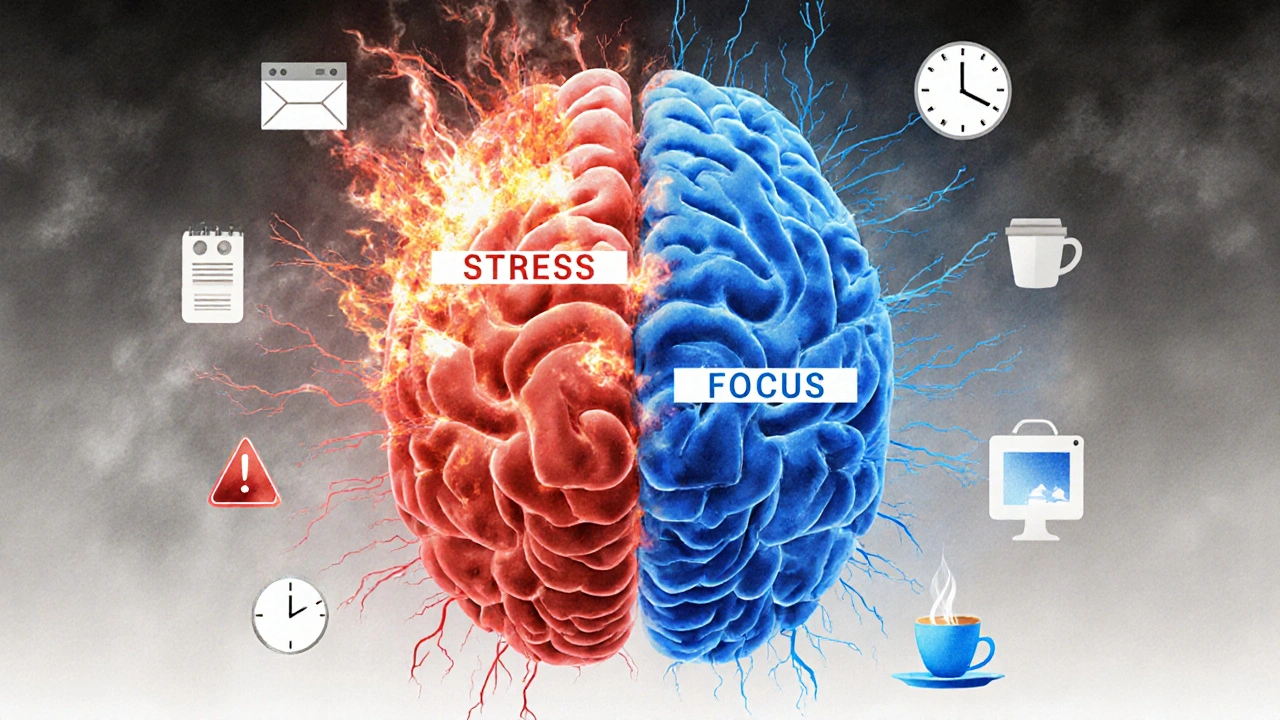Stress Impact Calculator
How Stress Affects Your Work
Based on research showing chronic stress reduces working memory by up to 30% and productivity by 40%.
Your Potential Productivity Impact
Based on your stress level, you could be experiencing up to 30% reduced cognitive performance. This means:
- You may take up to 30% longer to complete tasks
- You may make up to 40% more errors
- Your decision-making speed could be up to 22% slower
With just 5 minutes of daily stress reduction, you could regain up to 1.5 hours of productive time each week.
Neuroscience-Backed Reset Techniques
Try these scientifically proven methods to interrupt stress cycles in under 2 minutes:
When you’re overwhelmed, your brain doesn’t work like it used to. Simple tasks take longer. Decisions feel impossible. You forget names, miss deadlines, and feel like you’re running in place-even when you’re putting in 12-hour days. That’s not laziness. That’s stress doing its job: shutting down non-essential systems to keep you alive. The problem? Modern life never turns off the alarm. And your productivity pays the price.
Stress Isn’t Just a Feeling-It’s a System Failure
Stress isn’t just about feeling anxious. It’s a biological cascade. When your brain senses threat-whether it’s a looming report, a noisy office, or a text from your boss-the hypothalamus triggers cortisol and adrenaline. Heart rate spikes. Muscles tense. Blood flows away from your prefrontal cortex-the part of your brain responsible for focus, planning, and problem-solving-and toward your limbs, preparing you to fight or flee.
That’s fine if you’re running from a bear. Not so great when you’re trying to write a budget forecast.
Research from the American Psychological Association shows that chronic stress reduces working memory capacity by up to 30%. That means even if you’re working hard, your brain is operating on 70% power. You’re not lazy. You’re biologically compromised.
How Stress Kills Productivity (Without You Realizing It)
Most people think productivity is about doing more. It’s not. It’s about doing less, but better. Stress sabotages that in four quiet, invisible ways:
- Decision fatigue: Every stressful day drains your mental energy. By 3 p.m., you’re picking the easiest option-not the best one. That’s why you order takeout instead of cooking, or click ‘Send’ on an email you know needs editing.
- Attention fragmentation: Stress makes your brain hypersensitive to distractions. A notification, a cough, a flickering light-it all feels urgent. Studies show it takes an average of 23 minutes to refocus after a single interruption. Stress makes those interruptions happen more often.
- Procrastination by avoidance: When a task feels overwhelming, your brain doesn’t say, ‘I’ll do it later.’ It says, ‘I’ll do anything else.’ Cleaning the fridge. Organizing your inbox. Watching three YouTube videos about how to organize your inbox.
- Physical drain: Cortisol raises blood sugar, suppresses immune function, and disrupts sleep. Poor sleep? That’s a 40% drop in cognitive performance the next day, according to Harvard Medical School. You’re not tired because you worked hard. You’re tired because your body is stuck in survival mode.
Stress Reduction Isn’t About Meditation-It’s About Resetting Your Nervous System
You’ve heard it before: ‘Just meditate.’ ‘Take deep breaths.’ ‘Go for a walk.’ Those things help-but only if you do them right. Most people treat stress reduction like a band-aid. They breathe for 30 seconds and go back to their inbox. That’s not a reset. That’s a pause.
Real stress reduction means interrupting the cycle. Here’s what actually works, backed by neuroscience and real-world results:
- Control your environment before your mind: Noise, clutter, and constant notifications keep your nervous system on high alert. Turn off non-urgent notifications. Close your door. Use noise-canceling headphones-even if you’re not playing music. Your brain doesn’t need to process every sound. A 2023 study from the University of Sydney found that workers who reduced ambient noise by 50% saw a 22% increase in task accuracy.
- Move before you think: Physical movement doesn’t just burn off adrenaline-it resets your autonomic nervous system. A 10-minute walk outside, especially in green space, lowers cortisol levels by 15% in under 15 minutes. You don’t need to run a marathon. Just walk. Look at trees. Don’t check your phone.
- Use the 5-4-3-2-1 grounding technique: When you feel your mind racing, stop. Name: 5 things you can see. 4 things you can touch. 3 things you can hear. 2 things you can smell. 1 thing you can taste. This isn’t woo-woo. It’s a sensory override. It tells your brain: ‘You’re safe right now.’ It takes 90 seconds. It works every time.
- Schedule ‘non-negotiable stillness’: Block 15 minutes in your calendar every day-not as a break, but as a reset. No phone. No email. No talking. Just sit. Breathe. Let your thoughts pass like clouds. If you can’t sit still, try journaling. Write down everything on your mind. Then tear it up. The act of writing clears mental clutter better than any app.

Why Quick Fixes Don’t Work (And What Does)
There’s a reason caffeine, sugar, and scrolling feel good in the moment. They trigger dopamine-the ‘reward’ chemical. But they also spike cortisol later. You’re not solving stress. You’re masking it with a temporary high.
Real progress comes from consistency, not intensity. One person I know in Adelaide started doing 5 minutes of breathing before every meeting. Not after. Before. Within six weeks, her team noticed she was calmer under pressure. She made fewer mistakes. She started getting promoted. She didn’t change her workload. She changed her nervous system’s response to it.
Stress reduction isn’t about adding more self-care. It’s about removing the things that keep your body stuck in emergency mode. You don’t need a spa day. You need to stop feeding your stress.
How to Know If Your Stress Reduction Strategy Is Working
Here’s how to track real progress-not how many apps you’ve downloaded, but how your body and brain respond:
- Do you catch yourself before you react? Instead of snapping at a colleague, do you pause and take a breath? That’s neural rewiring.
- Do tasks feel less heavy? You still have the same workload, but it doesn’t feel like you’re carrying a backpack full of bricks?
- Do you sleep through the night? If you’re waking up at 3 a.m. thinking about work, you’re still in stress mode.
- Do you remember what you did yesterday? Memory loss is a classic sign of chronic cortisol overload.
If you answer yes to at least three of these, you’re on the right track. Don’t wait for perfection. Just look for small, steady improvements.

The Bigger Picture: Stress Reduction Is a Performance Strategy
Top athletes don’t just train harder. They recover smarter. They ice baths, sleep tracking, breathwork, and scheduled rest. Why? Because performance isn’t about pushing harder. It’s about optimizing recovery.
Same goes for your brain. You’re not a machine that can run 24/7. You’re a biological system that needs cycles of tension and release. Stress reduction isn’t a luxury. It’s the missing piece in your productivity equation.
When you reduce stress, you don’t just feel better. You think faster. Make better decisions. Remember details. Stay focused longer. Your work quality goes up. Your mistakes go down. Your confidence returns.
That’s not magic. That’s biology.
Start Today-Not Tomorrow
You don’t need a week off. You don’t need a new job. You don’t need to quit social media.
Right now, do one thing:
- Turn off notifications for the next 90 minutes.
- Drink a glass of water.
- Stand up and stretch for 60 seconds.
- Look out the window for 10 seconds. Notice the sky.
That’s it. That’s your stress reduction protocol for today. No apps. No books. No expensive retreats.
Do that once. Then do it again tomorrow. And the next day.
Small, consistent resets beat grand, unsustainable gestures every time.
Your performance isn’t broken. It’s just buried under stress. Dig it out-one breath, one walk, one quiet moment at a time.
Can stress reduction really improve work performance?
Yes. Chronic stress impairs memory, focus, and decision-making by flooding your brain with cortisol. Studies show that reducing stress improves cognitive function by up to 30%, leading to fewer errors, faster problem-solving, and better decision-making-all directly boosting work performance.
Is meditation the best way to reduce stress?
Meditation helps, but it’s not the only or best way for everyone. Many people find it hard to sit still when stressed. Movement-based practices like walking, stretching, or even washing dishes mindfully can be just as effective. The key isn’t the method-it’s consistency. Doing something that resets your nervous system, even for 5 minutes a day, matters more than the technique.
How long does it take to see results from stress reduction?
You can feel calmer within minutes after a 5-minute breathing exercise or a short walk. But lasting changes-like improved focus, better sleep, and fewer stress reactions-typically show up in 2 to 4 weeks with daily practice. It’s not about quick fixes. It’s about rewiring your body’s default setting.
Does stress reduction help with procrastination?
Absolutely. Procrastination is often a stress response, not laziness. When a task feels overwhelming, your brain avoids it to escape the anxiety. Reducing stress lowers that emotional barrier. Once your nervous system feels safer, starting becomes easier. The goal isn’t to force yourself to work-it’s to make working feel less threatening.
Can I reduce stress without quitting my job or changing my life?
Yes. You don’t need to quit your job, move cities, or go on a retreat. Small, daily resets-like turning off notifications, taking a walk, or pausing before answering emails-add up. Most people overestimate what they need to change and underestimate what small, consistent actions can do. Start with one 5-minute reset a day. That’s enough to begin seeing results.

